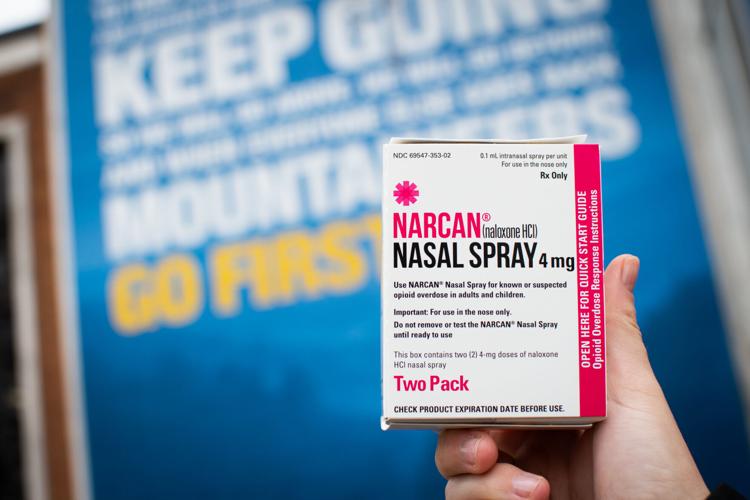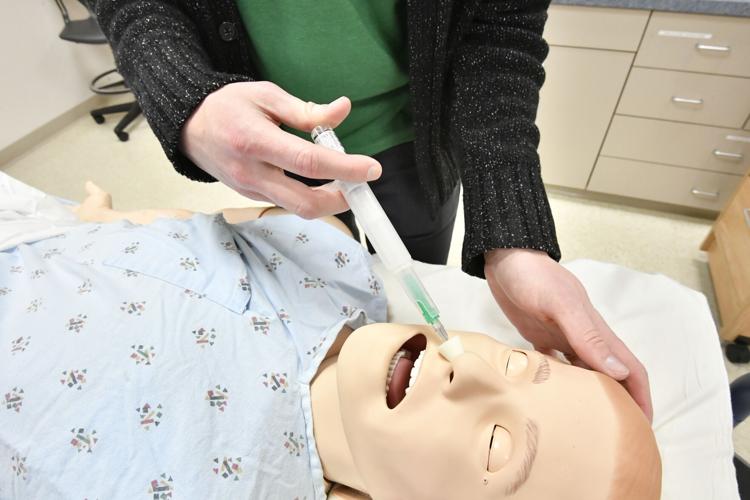Editor’s Note: Recovery from addiction is possible. For help, please call the free and confidential treatment referral hotline (1-800-662-HELP), or visit findtreatment.gov.
Oakland Resident Assistant Kassandra Hughes was off-duty last month when a resident started showing signs of a possible overdose.
“It's [a] ‘better to be safe than sorry’ type of situation,” she said. “I just asked the other RA to go get me the Narcan, and then we distributed it to the resident.”
Narcan, a brand of naloxone, is a life-saving medication that can rapidly reverse an opioid overdose for a short period of time.
“One big thing about Narcan is it will save the life of somebody who is potentially overdosing. But if they're not overdosing, it cannot hurt anybody,” Hughes said.
In an email to WVU’s student life directors, Executive Director of Residence Life Trish Cendana said the student was “drifting in and out of consciousness” after they “drank a lot” and took “various drugs.”
“When UPD and EMS arrived, the student was more stable and able to walk to the ambulance,” Cendana said. “Don’t know if this saved their life, but it was definitely what we had hoped to have occur by getting people trained and having Narcan available.”
Hughes, a junior, said she has long had a passion for naloxone accessibility.
“I grew up in Appalachia,” she said. “So I've just always witnessed addiction firsthand, like what it's done to people and how it's affected those around me.”
For her second job at the Mountainlair, she learned about naloxone, and as an RA, she was trained to stay calm in emergencies. But Hughes never thought she would actually have to administer the medication.
Until she did.
“Your hands are shaking … and you're so close to another person. And you're just trying to remember all the steps of how to administer this little spray,” she said.

WVU staff participate in Naloxone training at the WVU STEPS Lab Dec. 18, 2017.
Despite her stress, Hughes remained calm, and with her fellow RAs’ help, she said she kept the resident safe until EMS arrived.
“It was one of those situations where it's like, I didn't have time to freak out because I needed to do my job,” she said.
Hughes’ actions and quick thinking are the types of skills being taught campus-wide through University efforts to expand access to naloxone for students.
Instrumental to these efforts is Executive Director of West Virginia Sober Living and professor of addiction studies, Jon Dower.
“There are a lot of college students that experiment with psychoactive substances, whether that be alcohol or cannabis, or whatever, through their college experience, and I would hate to see a one-off attempt, maybe a poor decision on a bad night, cost somebody their lives,” he said.
Dower’s team at West Virginia Sober Living is part of the Monongalia Health Department’s Quick Response Team (QRT), which responds to overdoses and substance use cases in the county including those of college students.
“I've administered Narcan myself in my history. If they don't come around in three to five minutes you're supposed to give a second dose,” Dower said. “Those are the longest three to five minutes of your life.”
Every undergraduate class Dower has facilitated at WVU has included naloxone training as part of its curriculum.
“It empowers people and I think there's a lot of fear when you don't know what to do or how to do it, or what steps you should take should you be around someone that experiences an overdose, and we're empowering students to make important choices and decisions,” he said.
Dower believes that naloxone should be part of every medicine kit. The medication has the ability to save the lives of not only people with opioid use disorder, he said, but also geriatric patients and young children who may take an incorrect dosage or consume a medication by mistake.

Naloxone materials photographed at Serenity House, March 7, 2022.
But Dower isn’t the only one on campus working to spread awareness about naloxone. A team of peer recovery support specialists from his organization have also paired with the University to offer free trainings to students.
“When you do Narcan training, you demystify things,” he said. “When you bring in someone that's been revived by Narcan and you make it human, you remove some of that stigma and you let individuals see success stories.”
Since Fall 2020, the Univeristy has held 14 naloxone trainings, educating 444 students, staff and faculty about the medication, according to WellWVU.
In November, two trainings were held specifically for RAs, and naloxone is now available at the front desk of every residence hall.
“If it saves one life, that's all that matters, right?” Cendana said. ”If we save one life because of the use of Narcan then we've made a difference.”
The trainings, which typically run from 30 to 45 minutes, cover terminology, basic information about opioids, nasal sprays and other routes of naloxone administration.
“It's good to have an opportunity to go over some foundational information and an opportunity for people to ask questions and just get comfortable with the idea of administering Narcan,” Wes Thomas, a senior health educator with WellWVU who coordinated the trainings, said.
The trainings also cover warning signs of an overdose, such as lack of oxygen, less than six breaths per minute, gurgling sounds when breathing, blue-gray coloring on fingernail beds or lips or unresponsiveness.
WVU has also distributed over 200 fentanyl testing kits since Fall 2022, each containing three testing strips. The kits are available for free, anonymous pickup in the WELLWVU office by room 118 on the floor above Student Health in the Student Health Building.
These efforts come after House Bill 4373 became effective in June 2022, excluding fentanyl test strips from the definition of “drug paraphernalia,” in West Virginia.
Students are also raising awareness about resources in the greater Morgantown community.
The Mountaineer Fentanyl Education Taskforce is a student-led initiative that began work in August and has since gained over 700 followers and 23,000 engagements on Instagram. The group has also visited classes, met with administrators and tabled in the Mountainlair.

Mountaineer Fentanyl Education Task Force Members meet with Univerisity officials.
Left to Right: Logan Riffey, Zach Ellis, WVU professor Carolyn Atkins, U.S. Attorney William Ihlenfeld, WVU President E. Gordon Gee, Azeem Khan, Avery Conner, Emma Coiner, WVU Dean of Students Corey Farris.
“We definitely try to communicate to students that you don't have to be actively using drugs or think you're going to be using drugs to have these things,” the task force’s Communications Director Avery Connor said. “It's always just good to have just in case. You never know where you're going to be, who's gonna need it.”
The task force connects with students as peers encouraging them to learn about the dangers of fentanyl, act to use available resources and share the information.
“WVU wants to keep their students, their faculty, their staff safe and educated and informed. And I think that makes a huge impact,” Dower said.
With this education, Dower said, people are more likely to receive treatment. Moving forward, he hopes access to naloxone will continue to expand through training for all first-time freshmen and naloxone to be available on every residence hall floor and in every first aid kit.
“For every one individual that's impacted by a substance issue, five other people, on average are going to be impacted by that person,” Dower said. “So when you save one life with naloxone, you're really making that worst day for five other people a whole lot better.”
Those interested in naloxone training at WVU can learn about future events by following @wellwvu on Instagram or Facebook, reaching out to Wes Thomas at wthomas2@mail.wvu.edu or submitting a program request on the WellWVU website.
People can also contact the Monongalia Health Department or call the quick response team at 304-602-3305 for training and access.












 WVU's Independent Student Newspaper
WVU's Independent Student Newspaper